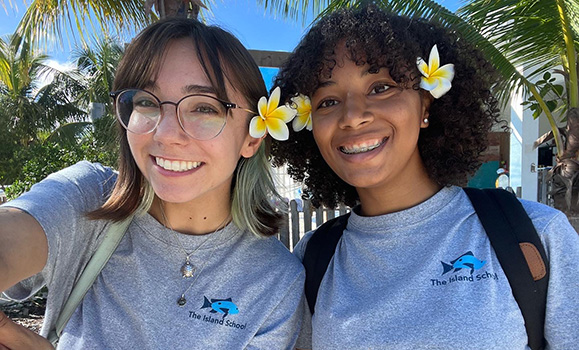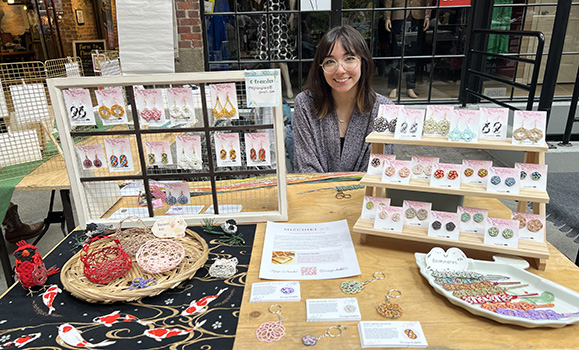This article is part of a series focusing on the grads of the ├█╠╥┤л├╜ Class of 2025. Spring Convocation takes place May 30 and from June 9-19 in Halifax and Truro. Read all our profiles┬аhere in one place┬аas they are published.
Upon entering university, some students know exactly what they want and are laser-focused on achieving their goals. For others, the journey is more important than the destination.
Meg Langlais, graduating with a Bachelor of Science in Biology and a minor in Indigenous Studies, represents a mix of both archetypes. Her university experience has not gone exactly as planned, but through it all, she has grown personally and professionally thanks in large part to new perspectives gained through co-operative education and experiential learning.
Looking for the right path
Aspirations of studying marine biology brought Meg from the small town of Dryden, Ontario тАФ located halfway between Thunder Bay and Winnipeg, Manitoba тАФ to Dal. The transition wasnтАЩt easy, though тАФ her first year was fully online due to the pandemic and she admits to struggling with her mental health throughout university. тАЬI really lost my sense of self for a long time,тАЭ she says.
After having difficulties in her second-year biology courses, Meg began to feel that perhaps her strengths were not in science. тАЬIтАЩm a very creative and emotional person, but I realized the тАШscience brainтАЩ doesnтАЩt come naturally to me,тАЭ she says. тАЬIтАЩm very passionate about conservation, so I tried to fit into that box, but it just didnтАЩt work for me. A big part of my time at Dal showed me that following the path that I thought was right wasnтАЩt actually right for me.тАЭ
I really lost my sense of self for a long time
MegтАЩs situation began to improve late in her second year, when enrolling in the science co-op program offered both new perspectives and changes of scenery. тАЬCo-op gave me these experiences to learn more about who I was that I couldnтАЩt get just being in the classroom,тАЭ she says.┬а
Her first placement, with , тАЬunlocked this whole new world,тАЭ with bird and wildlife photography since becoming hobbies. (For visual evidence, follow on Instagram).

Meg, left, had an тАЬamazing experienceтАЭ as a marine research intern at the Cape Eleuthera Institute in the Bahamas.
In her second co-op, Meg, whose self-described mixed background includes Japanese and M├йtis heritage, learned more about the Indigenous side of science with in Truro. That experience complemented one of her favourite courses, Science Topics in Indigenous Studies (INDG 3005), which she recommends to students looking to gain an appreciation of non-Western perspectives in science.
Her final placement, at the Cape Eleuthera Institute in the Bahamas as part of DalтАЩs Queen Elizabeth Scholars (QES) program, was an тАЬamazing experienceтАЭ and the turning point for the rest of her undergraduate studies. тАЬLiving on a small island for four months let me experience a strong sense of community, and being outside by the ocean every day was incredibly healing,тАЭ she says. As a marine research intern, Meg even co-authored a research paper on the relationship between nurse sharks and remoras that was published in the in July 2024.
Back in the classroom, Meg sought experiential learning opportunities through SEASIDE Program courses Ornithology (BIOL 3622) and Species at Risk (BIOL/MARI 3635), which both included week-long field trips. тАЬI loved those experiences,тАЭ she says. тАЬThe longer field trips can really bring you closer with peers, while gaining real experience and connecting with nature.тАЭ
Feeling like herself
As Meg prepares to cross the ├█╠╥┤л├╜ Arts Centre stage with her mother proudly watching on, she isnтАЩt entirely sure of her future plans. For now, she is comfortable living in the moment, working for a local Indigenous housing association and nurturing her creative pursuits, photography and mizuhiki, a form of Japanese knot-tying art ( on Instagram).

Outside of the classroom, Meg has launched a side business selling arts and crafts made using mizuhiki, a form of Japanese knot-tying artwork.
тАЬI think a lot of people in my position would be freaking out, but this is the calmest IтАЩve ever been,тАЭ she says.
тАЬEven though IтАЩm at a point where I donтАЩt know whatтАЩs coming, I feel like IтАЩm finally myself.тАЭ

